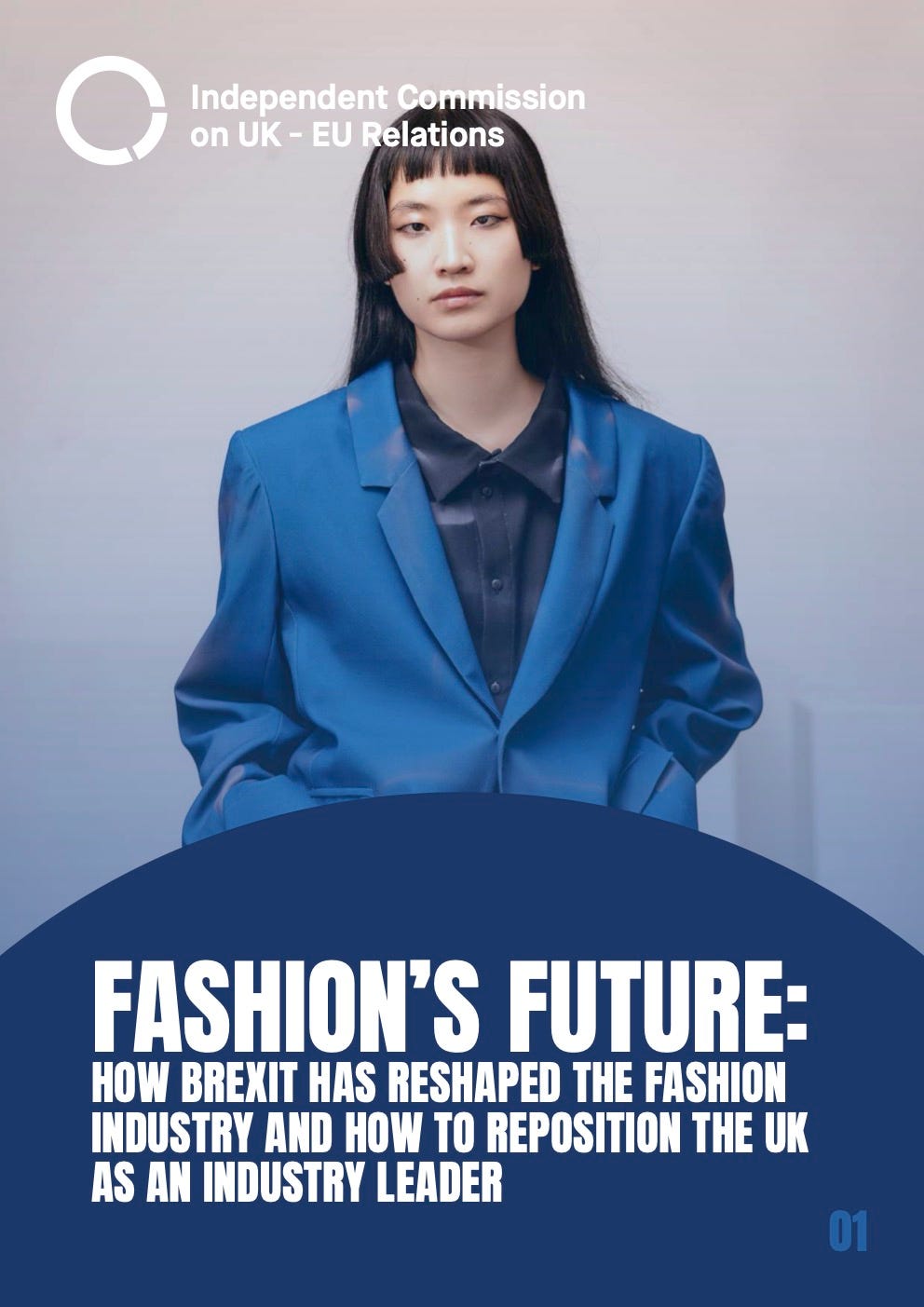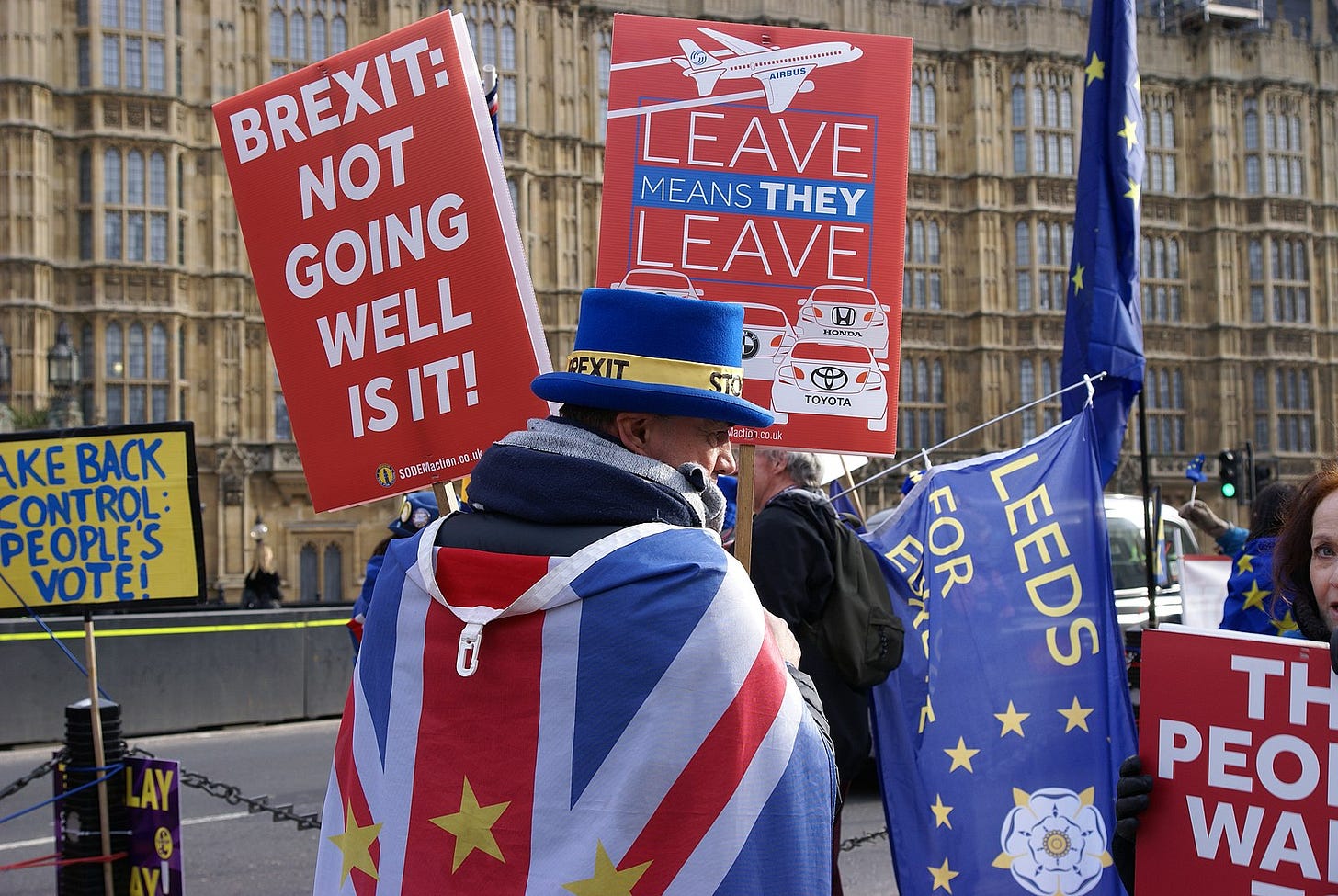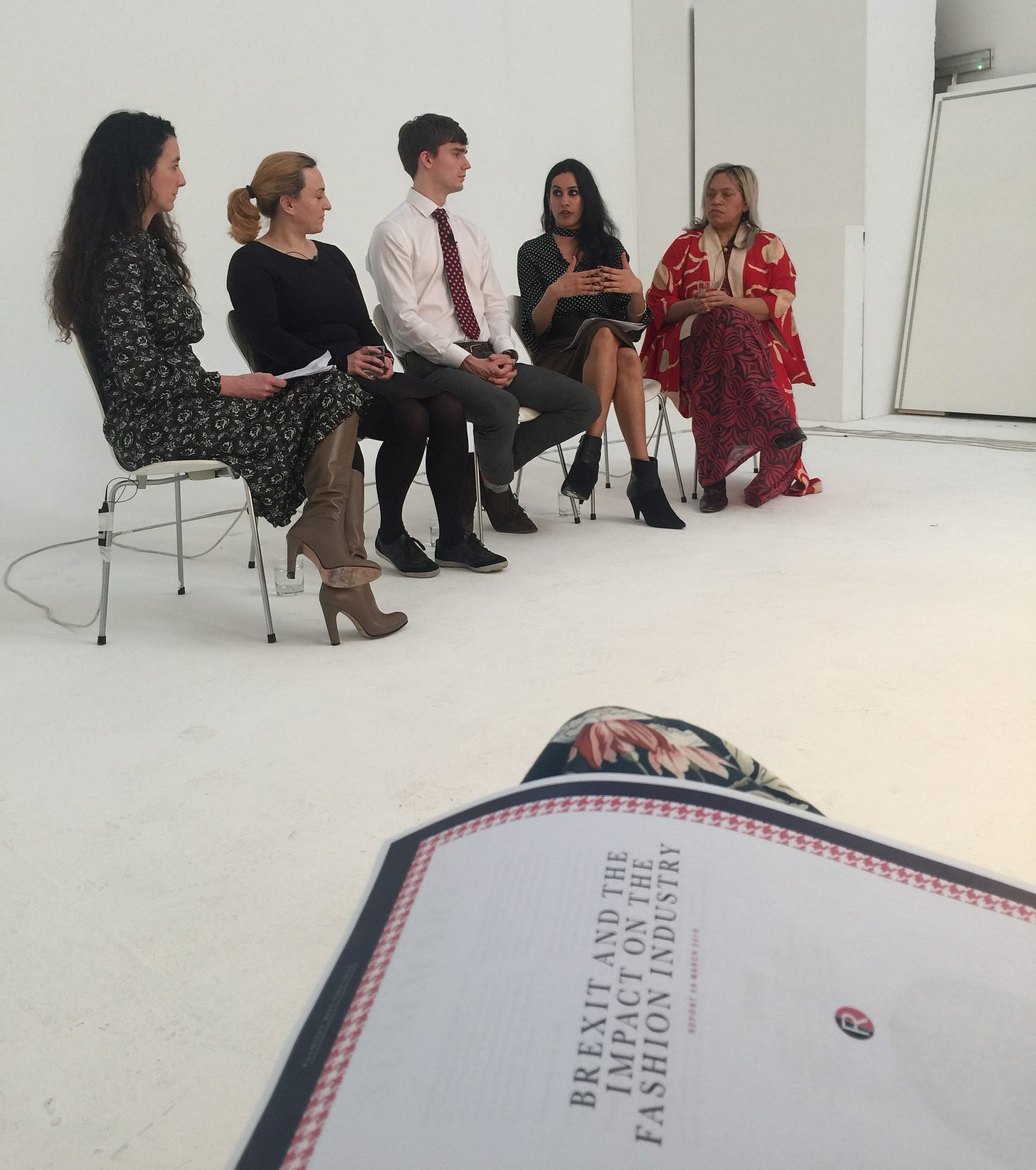The UK Fashion Industry Post-Brexit: New Report Highlights Challenges and Policy Solutions for Recovery
PLUS: Celebrating seven years of Fashion Roundtable!

By Alix Coombs
The UK fashion industry has faced significant disruption in the wake of Brexit, from customs barriers and administrative burdens to talent shortages and declining sales. As businesses continue to adapt to the new post-Brexit reality, Fashion Roundtable has published an in-depth report titled ‘Fashion’s Future: How Brexit Has Reshaped The Fashion Industry And How To Reposition The UK As An Industry Leader’, which outlines the industry’s most pressing challenges and offers policy recommendations for recovery and growth.
In partnership with the Independent Commission on UK-EU Relations, Fashion Roundtable is contributing to a broader series of reports that will inform a final publication, to be presented to both UK and EU governments at events in London and Brussels later this year. This is a critical opportunity to bring the voice of the fashion industry directly into the policy spaces in both the UK and the EU, advocating for the changes necessary to enable the British fashion industry to thrive once more. By joining this collaborative effort, we hope to create a more supportive environment for UK fashion businesses, ensuring their continued success on the global stage.
Public Survey: Gathering Industry Insights
In preparing this report, Fashion Roundtable conducted a public survey to gather firsthand information and evidence from industry professionals. The responses, collected from a range of stakeholders—including designers, manufacturers, retailers, and service providers—shed light on the real-world impact of Brexit on the fashion industry. The survey results further substantiate the findings of the report and underscore the urgency of implementing policy changes that address the ongoing challenges facing the sector.
The insights collected from the survey highlight the deep concerns about the future of the UK fashion industry and provide a clear picture of the policy areas that need attention. The feedback from those directly affected by Brexit’s impacts provides a powerful foundation for the report’s policy recommendations.
Key Findings: Challenges Facing UK Fashion Post-Brexit
The UK Fashion Industry Post-Brexit Report identifies three key areas where the UK fashion industry continues to struggle:
1. Customs Barriers and Administrative Burdens
Since the UK’s departure from the EU, customs barriers have been a major challenge. New regulations have resulted in delayed shipments, additional paperwork, and increased costs. These barriers are particularly detrimental to small and medium-sized enterprises (SMEs) that rely on efficient cross-border trade. The complexity and inconsistency of customs procedures, combined with the need for frequent adjustments, make it difficult for businesses to maintain fluid operations.
2. Talent Mobility and Workforce Shortages
The free movement of workers, a key benefit for the fashion industry prior to Brexit, has been severely impacted by the introduction of more stringent visa requirements. Fashion businesses—especially those reliant on international talent for design, marketing, manufacturing, and retail—are facing significant staffing shortages. This shortage is further compounded by a lack of clear pathways for young creative professionals to enter the industry, limiting the sector’s growth and innovation potential.
3. Sales and Trade Declines
The decline in trade with the EU and other regions has hit the UK fashion sector hard. Increased tariffs, customs checks, and delays have made UK-made products more expensive in international markets, while reducing the flow of goods from the EU. This has led to a drop in both exports and imports, resulting in lower revenue for UK-based fashion businesses.

Policy Recommendations: A Path Forward
The report presents five key policy interventions designed to address these challenges and ensure the UK fashion industry remains competitive:
1. Improved Trade and Customs Agreements
To address the customs barriers and administrative burdens, it’s essential for the UK to negotiate more favourable trade agreements, particularly with the EU. Simplifying customs procedures and reducing the red tape will enable businesses to save time and money while allowing SMEs to compete on a level playing field.
2. Enhanced Mobility for Creatives and Youth
Talent mobility is crucial for the fashion industry, which thrives on creative input from across Europe and beyond. To mitigate the talent shortages, the government must introduce new visa schemes that make it easier for young creatives to enter the workforce. This would ensure that the next generation of designers, artisans, and fashion professionals are able to access opportunities within the UK.
3. Reinstatement of the VAT Retail Export Scheme
Reintroducing the VAT Retail Export Scheme would help UK retailers attract foreign shoppers by making UK-made products more affordable and accessible. This would be a critical step towards stimulating the UK’s export market and driving growth in the retail sector.
4. Enhanced Support for SMEs
SMEs form the backbone of the UK fashion industry and need more tailored support to navigate the challenges posed by Brexit. This includes financial support, training programs, and clearer guidance on dealing with post-Brexit regulations. Providing SMEs with the resources they need will help them remain competitive and sustainable in the long term.
5. Increase Domestic Production and Develop Alternative Market Opportunities
Encouraging greater domestic production and exploring new international markets will help reduce the UK’s reliance on the EU and boost the resilience of the fashion industry. Support for local manufacturers and designers, as well as creating opportunities in emerging markets such as the US, Asia, and Africa, will help to drive the growth of UK-based businesses.
Why This Matters: A Call for Action
For those of us in the fashion industry, the findings of this report are not just an assessment of where we are—they are a call to action. The recommendations laid out in the report provide a practical framework for policy changes that can address the ongoing challenges facing UK fashion businesses. Through strong collaboration, we can ensure that the voice of the fashion industry is heard in the halls of government and that the sector receives the support it needs to thrive.
As part of this effort, Fashion Roundtable is committed to advocating for these policy changes across both the UK and EU. Whether you are a designer, manufacturer, retailer, or policymaker, the time to act is now. The future of the UK fashion industry depends on swift and decisive action to address the challenges posed by Brexit. Together, we can create a more supportive, sustainable, and competitive environment for UK fashion businesses.
We encourage you to read the full report and to share it with your colleagues, policymakers, and anyone invested in the future of fashion. Our collective efforts will ensure that the UK remains a leader in fashion innovation, sustainability, and creativity.

Celebrating Seven Years of Fashion Roundtable: A Pillar for a Resilient Fashion Industry
By Michelle Kazi, Fashion Roundtable
Seven years ago on the 21st November, Tamara Cincik and a newly assembled team of fashion and policy experts, including Professor Swati Dhingra who was our Economics Expert and is now external member of the Bank of England's Monetary Policy Committee and Karen Binns as Fashion Director, embarked on a mission to reimagine the relationship between the UK fashion industry and policymakers. Launched with a dinner attended by Sarah Mower MBE and others, that vision became Fashion Roundtable, an organisation that has evolved into a vital force advocating for a sustainable, inclusive, and economically robust sector. Committed to 3 pillars: Education, Representation and Inclusion and Sustainability and Social Justice, as we celebrate its anniversary, the impact of this organisation resonates more profoundly than ever.
The UK fashion industry, with a turnover of an estimated £109.9 billion annually and employing over 700,000 people, has faced seismic shifts since Brexit. The challenges have been relentless—rising operational costs, diminished market access, and a talent drain threatening the sector’s global standing. Amidst these, Fashion Roundtable has stood firm, championing the industry’s voice and pushing for solutions to secure its future.
Policy Advocacy: Shaping the Narrative, Driving Change
Fashion Roundtable’s commitment to policy advocacy is unwavering. Serving as the secretariat for the All-Party Parliamentary Groups (APPGs) for Fashion and Textiles, and Ethics and Sustainability in Fashion, the organisation has consistently brought the industry’s challenges to Westminster. These platforms have enabled Fashion Roundtable to not only raise the alarm on critical issues but also present actionable recommendations.
The latest report, “Fashion’s Future: How Brexit Has Reshaped the Fashion Industry”, published just two days before this anniversary, exemplifies the organisation’s proactive approach. It provides an unflinching analysis of the deep scars Brexit has left on the industry, including the 60% decline in clothing and footwear exports to the EU since 2019. SMEs, which account for 90% of the sector, have been hit hardest. Prohibitive customs procedures, lengthy delays, and rising operational costs have created barriers that are now existential for many businesses.
The report also highlights the critical role of talent mobility, which has been significantly hampered by Brexit. Visa restrictions mean UK creatives can no longer collaborate seamlessly across Europe, leading to a talent drain that is eroding the sector's competitive edge. In response, Fashion Roundtable proposes pragmatic solutions: renegotiating trade agreements, introducing bilateral visa schemes for creatives, and reinstating VAT-free shopping for international tourists to stimulate economic activity.
Groundbreaking Research: A Legacy of Insightful Reports
Fashion Roundtable has consistently delivered reports that go beyond data to tell the story of an industry that drives culture, innovation, and economic growth. The “Fashion & Economic Value Report 2024” detailed the sector’s contribution in billions to the UK economy and its pivotal role in regional job creation. By focusing on areas like Yorkshire and the Humber, where manufacturing and textiles form the backbone of local economies, the report underscored the sector’s importance beyond London’s fashion capitals.
The “Creative Wellbeing Economy Report 2023” shifted the narrative to how fashion contributes to societal wellbeing, promoting a vision where creativity drives not just economic but also social progress. These publications have become essential tools for policymakers and industry leaders alike, guiding decision-making in uncertain times.
Sustainability: Leading the Charge for a Greener Future
At the core of Fashion Roundtable’s mission is sustainability. The Great British Wool Revival in partnership with YNAP and the King's Foundation is a shining example of this commitment. This initiative tackles the underutilisation of one of the UK’s most iconic natural resources—wool. Despite its renewable, biodegradable properties, British wool has struggled to compete with cheaper synthetic alternatives.
The Revival connects farmers, designers, and manufacturers to create local supply chains that are not only more sustainable but also more resilient. Wool from breeds like the Romney, Herdwick, and Scottish Blackface is being championed as a high-quality, versatile material for both fashion and interiors. By focusing on domestic production, the initiative reduces carbon footprints, preserves traditional skills, and reinvigorates regional economies.
In tandem with this, Fashion Roundtable has pushed for greater government support for regenerative farming practices, subsidies for local manufacturers, and consumer education to highlight the environmental and economic benefits of British wool. It’s a project that epitomises Fashion Roundtable’s ability to merge sustainability with economic growth.
Brexit’s Legacy: Navigating the Post-EU Landscape
Brexit has left no part of the UK fashion industry untouched. Fashion Roundtable’s 2021 report on Brexit provided a sobering account of the early impacts, but today, the scale of the challenge is even clearer. Customs processes have become a minefield for SMEs, with increased paperwork, tariffs, and delays stifling their ability to trade with the EU—once the sector’s largest export market.
One of the most harrowing statistics in the latest report is the drop in exports to the EU, from £7.4 billion in 2019 to £2.7 billion in 2023. For small brands, the cost of compliance often outweighs the potential profits of EU trade. Many are left with a stark choice: scale back operations or relocate to the EU. Both options mean a loss of jobs, talent, and investment for the UK.
The disruption extends to talent mobility. Before Brexit, UK designers and models could easily work across the continent. Today, visa restrictions limit their time in the EU, complicating contracts and increasing costs. For young creatives, the loss of Erasmus internships has closed vital pathways to experience and opportunity, weakening the next generation of British talent.
Fashion Roundtable’s recommendations in “Fashion’s Future” are a lifeline. Simplifying customs processes, harmonising regulations, and investing in export hubs within the EU could ease the burden on SMEs. Restoring visa-free work for creatives and reinstating schemes like Erasmus would also help restore the UK’s competitive edge.
Collaboration and Critique: A Constructive Approach to Governance
Fashion Roundtable’s relationship with the government has been both collaborative and critical. Under the current Labour government, led by Keir Starmer, there is a renewed focus on creative industries as drivers of national growth. However, Fashion Roundtable has not hesitated to point out gaps in policy, especially in addressing the fallout from Brexit.
Their proposals, from supporting domestic manufacturing to negotiating frictionless trade agreements, are as pragmatic as they are visionary. Fashion Roundtable has also been vocal about the need for a cohesive strategy that prioritises fashion as a cultural and economic asset.
A Call to Arms: The Importance of Fashion Roundtable’s Work
Fashion Roundtable’s work over the past seven years has been nothing short of transformative. It has given the UK fashion industry a voice at the policymaking table, ensuring its concerns are not just heard but acted upon.
In a post-Brexit world, where the challenges are immense and the stakes are high, Fashion Roundtable’s efforts are critical. This is an organisation that doesn’t just identify problems—it proposes solutions and drives change. Its vision of a sustainable, inclusive, and globally competitive UK fashion industry isn’t just aspirational; it is essential for the future of this £110 billion sector.
As we celebrate this milestone and our more recent partnership with Bath Spa University to deliver on the National Centre for Fashion and Sustainability, developing a new approach to fashion education and business pathways
Fashion Roundtable Library: Unlocked: The Real Science of Screen Time (and How to Spend It Better) by Pete Etchells
In Unlocked, Pete Etchells, Professor of Psychology and Science Communication at Bath Spa University, cuts through sensationalist narratives to explore the real impact of screen time on our well-being. Blending science with storytelling, he investigates how technology shapes our mental health, creativity, and relationships, offering practical advice on building healthier digital habits.
The themes of the book theme align with Fashion Roundtable’s commitment to fostering a creative wellbeing economy—one that prioritizes balanced, intentional use of technology to support both innovation and mental health. Screens have come to dominate every corner of the fashion industry, once an inherently hands-on sector.
Etchells reminds us that it’s not about rejecting screens, but about using them to enrich rather than deplete our lives—a vital perspective in our fast-paced digital world.
Event: Sanja Stories - Radical Idealists, 5th December, London
Sanja Stories is a collaboration between radical idealists to create durable clothes that fit for a lifetime using regenerative practices, circular design and community creation within a transparent supply chain.
Join Sanja Stories for an inspiring evening celebrating sustainable fashion at their live event!
Get ready to be wowed by the stories of radical idealists who are shaping the future of the fashion industry. From innovative designs to eco-friendly practices, this event will showcase the best of Regenerative fashion.





